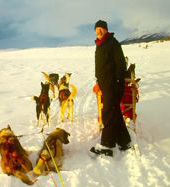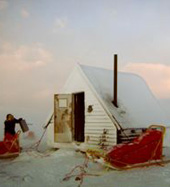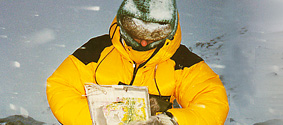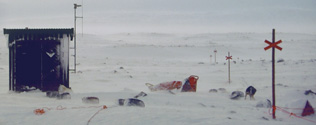



Research
Human adaptation to climate change is a major global challenge
and a top priority programme for the Norwegian chairmanship
of the arctic council (2006-2008)
The Arctic "frontline"
Arctic indigenous communities, such as the Sámi, are on the “frontline” of climate change, where both ecological and cultural systems are undergoing rapid change. Pragmatically we wish to gather information on observable patterns of environmental change, as seen by Sámi reindeer-herding communities in Northern Norway (Finnmark).
Empirical data on early ice-thaw, and permafrost degradation, will be collected and analysed in relation to reindeer herding and renewable resource use.
Field research will concentrate on shifts in herds’ migration routes to spring calving grounds, and consequently on traditional year-round economic practices, in order to focus, more broadly, on reindeer herding knowledge in a changing climate.
Fieldwork methods
Combining natural and social science techniques, this cross-disciplinary project is based on both quantitative (using historic climate modelling maps) and qualitative (participant observation) methods.
The latter will include field interviews to focus on:
* herding practices in the specific regions travelled.
* how herding practices and use of grazing grounds have changed over the last
years due to exceptional weather conditions (i.e. the 96/97 winter when icing led
to locked and inaccessible pastures in late winter).
* potential changes in land use with more rain, wind, warmer weather, etc.
The participant observation methods will focus on current reindeer herding practices, land use, and reindeer management patterns in the areas explored. Such methods are looking specifically for integrating elements of Traditional Economic Knowledge (TEK) acquired through life experience and adaptation. This because traditions are acquired through practise (“Enskillment” - Ingold,2000).
Our choice of Sámi Siida will be critical for the scientific outcome of our interviews. All Siida have undergone great changes in herding practices over the past decades due to increased use of snowmobiles, and ATVs. Siida have also changed their land use and herding practices due to other factors. We plan to look therefore at Siida with:
* Minimal changes in human development and activity (tourism, military activity,
industrial development)
* minimal changes in other land use practices (such as sheep grazing).
* stable herding practices preferably with the same families.
* no major conflicts with neighbouring districts.
In addition we shall be comparing today’s herding practices with a handful of existing sources on reindeer herding practices in Finnmark from the 1950s onwards.
What will the research be used for?
The Finnmark 2007 Expedition team believe that there are strong potential benefits to be gained from this experience. Giving visibility, through the high profile nature of this journey, to the issues experienced by the Sámi today in their fight for social and cultural survival is crucial. How they choose to face their responsibilities and the future in a fragile environment of huge importance to a world-wide public is a question that we need to answer. The Sámi have much to teach us:
* The team will firstly present its findings to the Royal Geographical Society (London) within the year, and also to the Scott Polar Institute (Dr Piers Vitebsky), the Norwegian Polar Institute (Gunn Sissel Jaklin), and to the Swedish Polar research Secretariat (Dr Magnus Tannerfeldt).
* The documentary film made of our travels can and should be a valuable tool in fighting ignorance about climate change and in making people aware of the urgency with which these issues must be addressed, and our own responsibility encouraged.
* A children’s book looking at the integral relationship between beast (reindeer) human (Sámi) living in nature, round a human interest story, can develop awareness of climate change in younger students and children.
* The expedition diary and proactive website will also be used as tools for understanding in primary and secondary schools, coordinated through students at Imperial College London..
* We hope to produce a story of our journey and experiences travelling through Sapmi, for publication in Britain and America.